Ungated Post | 20 Jan 2016
Digital disruption: The growth multiplier

Accenture Research and Oxford Economics have estimated that the digital economy, involving some form of digital skills and digital capital, represents 22.5 percent of global GDP. However digital’s ability to unlock value is far from being fully exploited. Until now, it is the technology giants and born-digital companies that have taken advantage of digital disruption. But there is an opportunity for traditional incumbents to more aggressively pursue new digital business models. By optimizing their digital investments, business leaders and policy makers can be more competitive, productive and bring quality of life to people. Understanding where to make those investments to realize the greatest improvement in gross domestic product is the subject of recent analysis by Accenture Strategy and Oxford Economics.
We found that high-performing economies could realize better returns from the optimal combination of investments in digital skills, digital technologies and digital accelerators. Our modelling shows how the smarter use of digital could boost productivity and generate US$2 trillion of additional economic output by 2020. In this way, digital investments can act as a growth multiplier in the coming years. Take the United States where optimised in investments in digital skills, digital technologies and digital accelerators in line with our calculations could see the nation increase its GDP by 2.1 percent—which equates to US$421 billion in 2020. Business leaders and policy makers need to invest the right amounts in the right areas; by doing so, they can discover new profitable, scalable and sustainable ways to help their economies grow.
Click here to read the full report.
Oxford Economics’ team is expert at applying advanced economic tools that provide valuable insights into today’s most pressing business, financial, and policy issues.
To find out more about our capabilities, contact:
Americas
Diantha Redd
+1 (646) 503 3052
Email
Asia Pacific
Peter Suomi
+65 6850 0110
Email
EMEA
Aoife Pearson
+44 (0)203 910 8054
Email
Related Services

Post
The economic impact of abandoning the WTO
Oxford Economics have been commissioned by the International Chamber of Commerce (ICC) to provide an independent assessment of the economic impact of WTO dissolution. This report details our findings and the assumptions underpinning our analysis.
Find Out More
Post
The economic impact of the sports activities of public service media
This study shows how the sports activities of public service media supported €4.5 billion of GDP and 57,000 jobs across 31 European countries in 2022. The report also highlights wider economic benefits of public service media sports coverage, such as the way in which it leverages sponsorship income for sports bodies.
Find Out More
Post
Global Trade Education: The role of private philanthropy
Global trade can amplify economic development and poverty alleviation. Capable leaders are required to put in place enabling conditions for trade, but currently these skills are underprovided in developing countries. For philanthropists, investing in trade leadership talent through graduate-level scholarships is an opportunity to make meaningful contributions that can multiply and sustain global economic development.
Find Out More